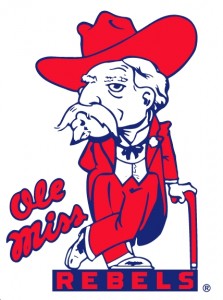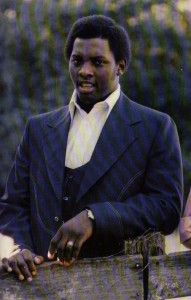When you think of the University of Mississippi, the first thing you think of is the past.
–Deuce McAllister, former Mississippi star running back (Source: ESPN.com)

History and Overview: The University of Mississippi was chartered in 1844 and welcomed its first students in November of 1848. At that time the University enrolled 80 students and employed 4 faculty members. The University of Mississippi Law School opened in 1854. The school suspended classes for four years during the Civil War, and then reopened in 1865. In 1882 Ole Miss enrolled it’s first women students (11 undergraduates). The first female faculty member, Sarah Issom, was hired in 1885. The University enrolled its first African American student, James Meredith, in 1962. Mississippi hired its first Black faculty member in 1970.
Today the University of Mississippi enrolls 14, 016 students at its Oxford campus. African American students make up 13% of the student body, constituting the largest minority on campus. Asian American students make up roughly 2.6 percent of the student body, and other ethnic minority groups account for less than 1% of the Ole Miss enrollment.
Black Milestones at the University of Mississippi:
1962 — James Meredith becomes the first African American student at the University of Mississippi
1967 — Reuben V. Anderson becomes the first African American to graduate from the University of Mississippi Law School. He would go on to become the first African American justice on the Mississippi Supreme Court and the first Black president of the Mississippi Bar.
1968 — The University of Mississippi Black Student Union is founded. That same year Robert Walker becomes the first Black teaching assistant at Ole Miss, as well as the first Black student to receive a master’s degree from the University (in history).
1969 — Edgar Lee Caples becomes the first African American to graduate from the University of Mississippi School of Engineering.
1970 — African American students create the Black Law Students’ Association. In the same year, the University establishes the Afro-American Studies Program; and Jeanette Jennings becomes the first Black faculty member at Ole Miss (Social Work).
1971 — James Reed and Robert “Ben” Williams become the first African Americans to sign football scholarships with Ole Miss.
1973 — Omega Psi Phi becomes the first Black fraternity at Ole Miss.
1974 — Alpha Kappa Alpha becomes the first Black sorority at Ole Miss.
1975 — Ben Williams becomes the first African American elected by the student body as Colonel Rebel, the University’s highest elected award.
1976 — Peggie Gillom becomes the University’s first Black female basketball player.
1967 — Dr. Lucius Williams becomes the first African American administrator at Ole Miss (Vice Chancellor for Academic Affairs).
1982 — John Hawkins becomes the first African American cheerleader at Ole Miss.
1983 — Dr. Marsha Williams (Ph.D., Vanderbilt) becomes the first African American engineering professor at Ole Miss.
1994 – Dr. Louis Westerfield becomes the first African American dean at Ole Miss (Dean of the School of Law). In the same year, Dr. Erskine Smith is appointed the first Black department chair at the University (Home Economics, now called Family and Consumer Sciences).
1997 — Carissa Alana Wells becomes the first African American “Miss University.”

Ben Williams during his years at Ole Miss
(Source: U Miss African American Studies Department)
Posted by Ajuan Mance












